|
|
|
Sort Order |
|
|
|
Items / Page
|
|
|
|
|
|
|
| Srl | Item |
| 1 |
ID:
092401
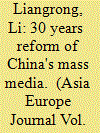

|
|
|
|
|
| Publication |
2009.
|
| Summary/Abstract |
The article reviews the evolution of China's mass media from their status as propaganda tools of the Communist Party to their current commercialized pluralist structure. It notably reviews the changes and rapid growth patterns of popular newspapers and TV programs and the concurrent restructuring of the media industry as well the impact of the Internet.
|
|
|
|
|
|
|
|
|
|
|
|
|
|
|
|
| 2 |
ID:
092403
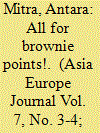

|
|
|
|
|
| Publication |
2009.
|
| Summary/Abstract |
The emergence of a global new media model aided by the technological revolution of the twenty-first century, economic globalization and political neo-liberalism, has transformed the traditional old model of media as a democratic pillar of public service into a new profit-oriented model of media as a corporate business enterprise primarily dependent on advertisement revenues. This change in the media ownership has had significant negative implications for media coverage and content. In this changed scenario of eclipse of investigative and critical journalism and triumph of infotainment journalism, this new corporate media, especially in the post-9/11 era, has nonetheless made itself particularly vulnerable to the terrorist manipulation of mass media as an advertisement agent for terror. Through the specific case study of the media coverage of Mumbai terror attacks on November 26, 2008, this study attempts to reveal how the commercial agenda of the new media ends up furthering the terrorist agenda, albeit in immediate short run, of inculcating mass hysteria, irrational mob fury directed against the state thereby eroding, however temporarily, popular sovereignty of the state.
|
|
|
|
|
|
|
|
|
|
|
|
|
|
|
|
| 3 |
ID:
092402


|
|
|
|
|
| Publication |
2009.
|
| Summary/Abstract |
Broadcast television in Cambodia has historically been left out of scholarship, be it that of economics, politics, or mass communication. That, however, does not mean the study of Cambodia's broadcast TV has only academic significance. Indeed, the entire mass communication industry has experienced a sea of change since the introduction of the UN-backed democracy project in 1991, followed by the call for a "free market" economy and its accompanied globalized and liberal discourses. That wholesale political and economic shift has led, and continues to lead, to the transformation of not only the macro aspects of the state, such as the imposed structural adjustments as the pre-condition for international funding, but also the micro, private aspects of the society's members, those ranging from religious practices, gender relations, social and familial values, and the like. While that shift in the early 1990s is now a thing of the past, its social consequences are now more apparent than ever with such issues as gap of inequality and conflicts in social relations and values being strongly felt. Cambodia's television is indeed at the forefront of representing and acting in these social changes, which demands of academics, development workers, and policy makers interested in the country that they attentively examine the country's broadcast TV. Thus, this paper takes the chance to primarily draw a landscape of Cambodia's broadcast television as it is at present, while at the same time juxtaposing the industry against its current societal context. In doing that, I first put into perspective a brief historical development of broadcast television in relation to the country's political and economic shift. I then proceed to introduce an overall picture of Cambodia's broadcast TV, describing its current state of ownership, technological and regulatory framework, market, and programming. Eventually, I turn to provide a critical argument about the industry as a promoter of the surging consumerist desire-"freedom of choice"-for the last several years. Towards the end of the paper, I move toward a speculation over the future of Cambodia's broadcast TV by taking into account current institutional aspects of the country's politics and economy, as well as discursive aspects of technology, free market, and regulations.
|
|
|
|
|
|
|
|
|
|
|
|
|
|
|
|
| 4 |
ID:
092405
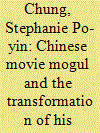

|
|
|
|
|
| Publication |
2009.
|
| Summary/Abstract |
The Cathay Organisation was a household name in the Chinese film industry. At its peak, it operated 75 cinemas and two movie studios, with a film distribution network spanning Malaysia, Burma, Thailand, Vietnam, Hong Kong, and Taiwan, as well as Europe and Latin America. In the public's mind, Cathay was synonymous with its charismatic founder, Loke Wan Tho (1915-1964). Well versed in literature and ornithology, Loke appeared as a British gentleman, always meticulously dressed and elegantly mannered in his dealings with political leaders and movie celebrities. But underneath its gracious surface, Cathay was constantly struggling to sustain itself against problems that arose due to its rapid expansion. Although Cathay often produced impressive movies with graceful stars, high production costs could not be supported by the box-office revenues. By tracing the transformation of Cathay, this article will examine the dynamics of a Chinese family business in its attempt to survive amidst political chaos in Southeast Asia. Surviving generational succession, corporate consolidation and waves of political crises, Cathay's story not only mirrors the transformation of an overseas Chinese family business over the past 100 years but also reflects a larger historical picture.
|
|
|
|
|
|
|
|
|
|
|
|
|
|
|
|
| 5 |
ID:
092407
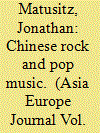

|
|
|
|
|
| Publication |
2009.
|
| Summary/Abstract |
This paper provides a detailed semiotic analysis of Chinese rock and pop music in the past 30 years. To support this analysis, an historical account of Chinese music from the third millennium B.C. to the Mao period is offered to explain how semiotics and music in China have been highly interrelated and how rebellious rock and pop was born in China. Chinese rock and pop was shaped by historical events. This paper does not only focus on popular music and its symbols, but also on the tools for the application of semiotic concepts in rock and pop music analysis and on the need for understanding and differentiating areas and relevant points of view.
|
|
|
|
|
|
|
|
|
|
|
|
|
|
|
|
| 6 |
ID:
092410
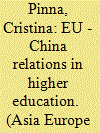

|
|
|
|
|
| Publication |
2009.
|
| Summary/Abstract |
The internationalization of higher education systems has become critical to the educational success of a country. The purpose of this research is to carry out a study of the growing pace of internationalization in Chinese higher education in the contemporary period. The research focuses on the cooperation between China and Europe, especially the management of transnational projects related to improving collaboration between Chinese and European institutions of higher education. The move to mass higher education in the Chinese context and its implications stand as the starting point of the investigation. The project aims to analyze the main national policies for enhancing the internationalization of higher education both in China and Europe. Then, taking as examples some projects of particular relevance, it will consider the objectives and the consequences of these forms of cooperation and collaboration, especially for the development of the Chinese higher education system. Finally, a concise historical overview of the relations in higher education between China and Europe in the last 20 years will facilitate understanding of the changing role played by Europe in the Chinese context.
|
|
|
|
|
|
|
|
|
|
|
|
|
|
|
|
| 7 |
ID:
092400


|
|
|
|
|
| Publication |
2009.
|
| Summary/Abstract |
Illuminating on the power transition theory, realists are more than convinced of potential structural conflicts in both economic and security realms due to China's rise. They see China as a dormant source of challenges to American preeminence, economic policies of the west as evident in the recent negotiation discourses (e.g., G-20 and G-8 meetings), the "western" norms of diplomacy (e.g., Washington consensus) in developing countries including in Africa, and security concerns of its neighboring states. However, China will be able to avoid this claimed inevitability by abiding to peaceful ideas deeply embedded in "New Security Concept," "peaceful rise theory," "peaceful development" and a "harmonious world" doctrine. This paper argues that China will be able to rise peacefully because of the efficacy of practicing liberalism and constructivism at large in its diplomacy. China is increasingly and genuinely embracing shared norms and institutions, gradually gravitating East Asian regional order to its favor in the form of power constellation.
|
|
|
|
|
|
|
|
|
|
|
|
|
|
|
|
| 8 |
ID:
092408
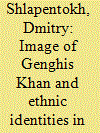

|
|
|
|
|
| Publication |
2009.
|
| Summary/Abstract |
The recent rise of Asia as a global geopolitical center has led to renewed interest in Asian history, not just by Asians but by Europeans as well. Genghis Khan is one of those figures who attracts attention, and several movies on him have recently been created. One of them was made in Russia and has led to broad public response. These responses have made it possible to gauge the views of the Russian public on the role of Russia in the global community and the relationship between Russians and ethnic minorities of the Russian Federation.
|
|
|
|
|
|
|
|
|
|
|
|
|
|
|
|
| 9 |
ID:
092404


|
|
|
|
|
| Publication |
2009.
|
| Summary/Abstract |
In today's global landscape, the success of interfaith initiatives is ascertained when their intended aim is envisioned and clarified. This article claims that the truest aim of interfaith dialogue in global perspective is the mutual transformation of cultural and religious realities, maintaining that when this vision becomes the underpinning informing the context of dialogue then interfaith engagement is elevated to an authentic spiritual practice effective across religious borders, assuring its destination in the advancement of intercultural relations and culture in general. Today, interfaith dialogue ought to focus more on common responses to global issues rather than differences among traditions; unimpeded, it can then engage mutual transformation for the benefit of all, achieving also significant steps toward transforming stultifying paradigms of present interreligious discourse. Positive change forwarding harmonious coexistence is an ongoing process involving the work of many generations. Steadfast youth involvement in interfaith dialogue is deemed imperative for sustainable harmony and peace.
|
|
|
|
|
|
|
|
|
|
|
|
|
|
|
|
|
|
|
|
|